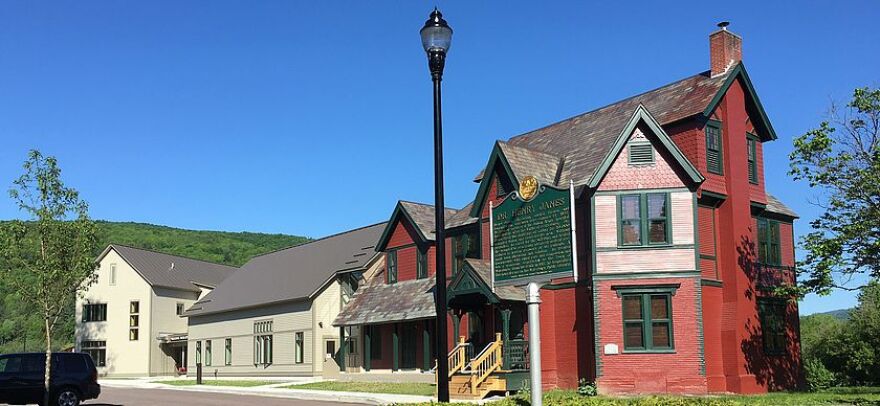If you take a quick scan at this year's Town Meeting Day warnings, you won't find too many ambitious projects that require long-term borrowing. Vermont town officials say ongoing debates in Washington and Montpelier are making it hard to plan too far into the future.Fayston — a tiny town wedged into the Mad River Valley, about a half-hour west of Montpelier — is home to a little more than 1,300 people. And selectboard member Chuck Martel says Fayston's town meeting warning this year is pretty vanilla.
When the people of Fayston get together on Town Meeting Day, they'll elect town officials, vote on the budget and set the tax rate — and that's about it.
But Martel says he's been kind of wondering how the new federal tax law might weigh into people's decision-making.
"We all know that the tax structure has changed; nobody really understands the impacts because this is the first year that the taxes will affect us all," Martel says. "So, you can't predict that I guess, but I'm sure that that kind of thinking is going to be festering: 'Well, you're going to hit me with an increased income tax, maybe for the educational tax, and my property taxes at the municipal level continue to go up.' So that whole tax hypersensitivity, I guess, could very well play in."
Town Meeting is all about making local decisions, and in towns like Fayston, people elect cemetery commissioners and selectboard members who will help make both big and little decisions in the coming year.
But Fayston Selectboard Chairman Jared Cadwell says, increasingly, it feels like politicians in Washington and Montpelier are putting more demands on municipalities, without providing the money to see them through.
"The state government has a clear and necessary role in establishing the standards, establishing the goals and the objectives. All I'm arguing for is more delegation of funds and responsibility to the local governments to execute." — Jared Cadwell, Fayston selectboard chairman
"The state government has a clear and necessary role in establishing the standards, establishing the goals and the objectives," Cadwell says. "All I'm arguing for is more delegation of funds and responsibility to the local governments to execute. The responsibility ... I think we're ready to take it on, but we have to be able to afford it."
Cadwell says this seems like a particularly unsettling year.
Along with changes to the federal tax code, the Vermont Legislature is also debating changes to the education tax system, which could have some big ripple effects in how towns collect and spend money. And the message from Washington on transportation funding has also been mixed.
Karen Horn, director of public policy and advocacy for the Vermont League of Cities and Towns, says all of the uncertainty in Washington and Montpelier is creating some anxiety as local officials get ready for Town Meeting Day.
Horn says a lot of towns and cities are heading into town meeting with pretty modest budgets and a lot of questions about how it will all play out on the municipal level.
"There's a lot of unknowns out there, and I think what towns and cities are doing is taking a fairly conservative approach to their budget and trying to control those items that they can control." — Karen Horn, Vermont League of Cities and Towns
"There's a lot of unknowns out there, and I think what towns and cities are doing is taking a fairly conservative approach to their budget and trying to control those items that they can control," Horn says.
Another issue that's weighing on the minds of town managers and selectboards, as they get ready for town meeting, is the state's new clean water rules. Towns have new road maintenance standards to meet, which the state says will prevent runoff into streams — but that will cost the towns money.
Bill Shepeluk, Waterbury town manager, says lawmakers are also weighing a bunch of different assessments and fees to pay for the clean water initiative. And he says that means more work, and money, will be diverted from the services his town is trying to provide its residents.
"Any time we have to collect money at the local level that isn't really for our purposes, and we have to pass it along and pay it, it makes it that much more difficult to ... have the capacity to do the things that we believe is our responsibility," says Shepeluk. "So those kind of policy decisions, I think, wreak havoc on the ground in terms of really getting anything done that's substantial."

Shepeluk says even as the state tries to figure out how to pay to clean up the water, and Washington bickers over transportation funding and other issues, town meeting matters more than ever.
A debate at town meeting might come down to trying to find the $3,000 to get the recreation director more time, or maybe there will be time spent on funding the library.
But Shepepluk says those are the things that matter and those are the things that affect the citizens of Waterbury — and the citizens in every other Vermont town — day in and day out.
"We come together as community members, friends and neighbors, and we can usually discuss things, even things that we disagree about," Shepeluk says. "I think that's what town meeting is good for. And I think that engaging people and encouraging them to be involved in their local community government is still important. And I'm hopeful that at some point we'll decide that, you know, we need to be able to talk and listen in order to be productive as a society — and we'll see, if we get there."





